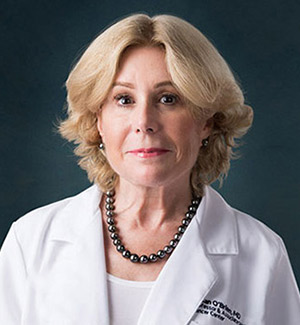Unique therapy shows promise to combat lymphoma in first-in-human clinical trial

Orange, Calif. — Early results for a first-in-human clinical trial of a novel gene-engineered therapy for relapsed or refractory large B cell lymphoma and B cell non Hodgkin lymphoma showed such promise that the FDA has granted expedited review status for the treatment called CB-010, developed by Caribou Biosciences Inc.
Leukemia specialist Dr. Susan M. O'Brien at the UCI Health Chao Family Comprehensive Cancer Center, presenting investigator for the ANTLER clinical trial, said data for the first cohort of patients demonstrated the potential of CB-010 to help patients with these highly aggressive diseases.
"Patients with relapsed or refractory B cell non-Hodgkin lymphoma are in need of treatments that are immediately available and do not require burdensome or ineffective bridging therapies,” said O'Brien, who looks forward to enrolling additional patients in the ongoing ANTLER trial.
The phase 1 trial, which opened in May 2021 at UCI Health, UC San Diego and eight other U.S. locations, is designed to evaluate the safety and efficacy of CB-010. It is the first clinical test of allogeneic anti-CD19 chimeric antigen receptor (CAR) T-cell therapy to use CRISPR hybrid RNA-DNA gene-editing technology to improve antitumor activity.
Clinical data for the first 12 months demonstrated long-term durability of response after a single infusion of CB-010 at an initial dose level of 40x10e6 CAR T cells, Caribou Biosciences reported in a news release. The results showed that:
- 6 of 6 patients in the first cohort achieved a complete response (CR) as best response
- 3 of 6 patients maintained durable CR at 6 months
- 2 of 6 patients maintain long-term CR at 12 months and remain on the trial
- 18 months is the longest CR maintained to date in ANTLER, achieved by the first patient dosed with CB-010
- CB-010 was generally well tolerated with adverse events consistent with autologous or allogeneic anti-CD19 CAR T-cell therapies
- Trial participants receiving higher dose levels have not displayed any safety issues
These findings led the U.S. Food and Drug Administration (FDA) last fall to grant regenerative medicine advanced therapy (RMAT) designation to CB-010 for relapsed or refractory large B cell lymphoma and fast-track designation for relapsed or refractory B cell non-Hodgkin lymphoma. Both designations permit expedited development and review, along with accelerated FDA approval processes for promising therapies.
In a presentation at the American Society of Hematology meeting in December, O'Brien noted the limitations of previous CAR T-cell therapies to treat adults with relapsed/refractory B cell non-Hodgkin lymphoma.
Although autologous CAR T-cell therapies have helped many patients, their efficacy can be limited by inherent functional T cell deficiencies. The complexity and lengthy time period needed to manufacture the therapies also limit patient access, which could necessitate bridge therapies, she noted in the poster abstract.
CB-010, by contrast, is an anti-CD19 CAR T-cell therapy derived from healthy donor cells, eliminating the need for patient leukapheresis — a treatment to remove white blood cells — or bridging therapies. CB-010 also demonstrated statistically significant preclinical survival benefits across B cell non Hodgkin lymphoma subtypes and longer-duration efficacy in vivo.
The clinical trial is expected to enroll up to 50 participants. Learn more about the ANTLER clinical trial ›
The Chao Family Comprehensive Cancer Center, ranked among the nation's top 50 by U.S. News & World Report, is the only National Cancer Institute-designed comprehensive cancer center in Orange County. Home to renowned oncology specialists, the cancer center treats more patients — and more complex cancer cases — than is other healthcare providers in the region. The cancer center offers the only adult hematopoetic stem-cell transplant services in the region. Its Sue and Ralph Stern Center for Cancer Clinical Trials & Research leads one of the largest early phase clinical research programs in Southern California, offering more than 300 active clinical trials, including leading-edge, first-in-human gene and stem-cell therapies. It is accredited by the Commission on Cancer and the American College of Surgeons for offering high-quality, multidisciplinary patient-centered care and certified for excellence in hematology/oncology care by the American Society of Clinical Oncology. It also has been named a Blue Distinction Center for Complex and Rare Cancers. Its more than 200 clinicians and scientists have produced over 1,500 journal publications since 2017 and have garnered more than $44 million to support groundbreaking basic and clinical research.




